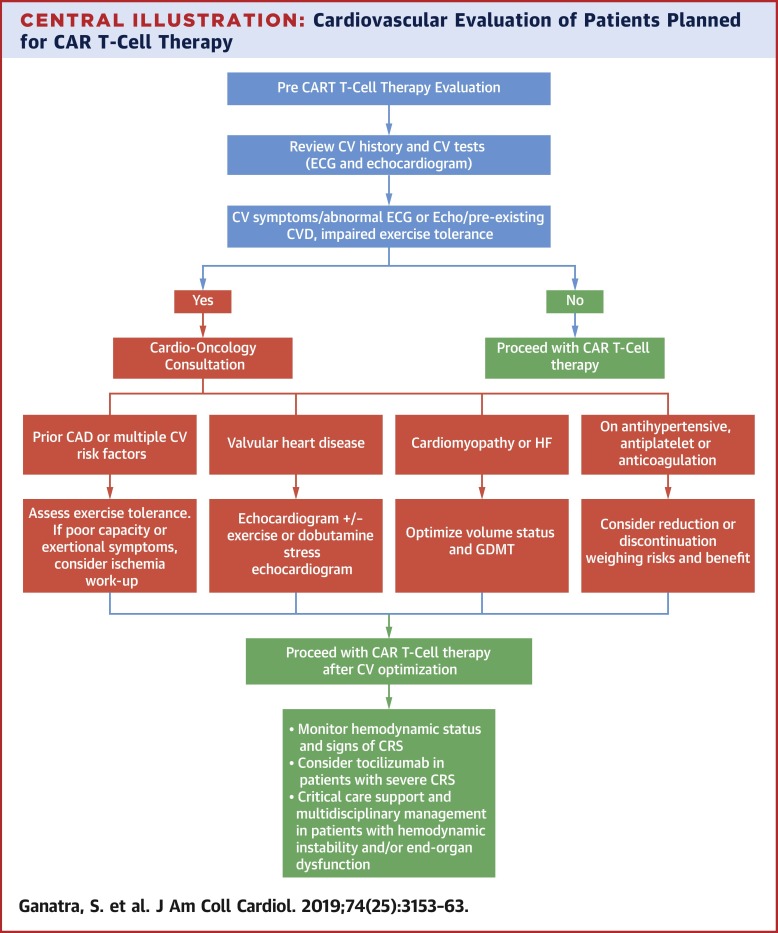当前位置:
X-MOL 学术
›
J. Am. Coll. Cardiol.
›
论文详情
Our official English website, www.x-mol.net, welcomes your feedback! (Note: you will need to create a separate account there.)
Chimeric Antigen Receptor T-Cell Therapy for Cancer and Heart
Journal of the American College of Cardiology ( IF 24.0 ) Pub Date : 2019-12-01 , DOI: 10.1016/j.jacc.2019.10.049 Sarju Ganatra 1 , Joseph R Carver 2 , Salim S Hayek 3 , Bonnie Ky 2 , Monika J Leja 3 , Daniel J Lenihan 4 , Carrie Lenneman 5 , Negaresh Mousavi 6 , Jae H Park 7 , Miguel Angel Perales 8 , Thomas D Ryan 9 , Marielle Scherrer-Crosbie 10 , Richard M Steingart 11 , Eric H Yang 12 , Vlad Zaha 13 , Ana Barac 14 , Jennifer E Liu 11
Journal of the American College of Cardiology ( IF 24.0 ) Pub Date : 2019-12-01 , DOI: 10.1016/j.jacc.2019.10.049 Sarju Ganatra 1 , Joseph R Carver 2 , Salim S Hayek 3 , Bonnie Ky 2 , Monika J Leja 3 , Daniel J Lenihan 4 , Carrie Lenneman 5 , Negaresh Mousavi 6 , Jae H Park 7 , Miguel Angel Perales 8 , Thomas D Ryan 9 , Marielle Scherrer-Crosbie 10 , Richard M Steingart 11 , Eric H Yang 12 , Vlad Zaha 13 , Ana Barac 14 , Jennifer E Liu 11
Affiliation

|
Chimeric antigen receptor (CAR) T-cell therapy has significantly advanced the treatment of patients with relapsed and refractory hematologic malignancies and is increasingly investigated as a therapeutic option of other malignancies. The main adverse effect of CAR T-cell therapy is potentially life-threatening cytokine release syndrome (CRS). Clinical cardiovascular (CV) manifestations of CRS include tachycardia, hypotension, troponin elevation, reduced left ventricular ejection fraction, pulmonary edema, and cardiogenic shock. Although insults related to CRS toxicity might be transient and reversible in most instances in patients with adequate CV reserve, they can be particularly challenging in higher-risk, often elderly patients with pre-existing CV disease. As the use of CAR T-cell therapy expands to include a wider patient population, careful patient selection, pre-treatment cardiac evaluation, and CV risk stratification should be considered within the CAR T-cell treatment protocol. Early diagnosis and management of CV complications in patients with CRS require awareness and multidisciplinary collaboration.
中文翻译:

用于癌症和心脏的嵌合抗原受体 T 细胞疗法
嵌合抗原受体 (CAR) T 细胞疗法显着推进了复发性和难治性血液恶性肿瘤患者的治疗,并且越来越多地作为其他恶性肿瘤的治疗选择进行研究。CAR T 细胞疗法的主要副作用是可能危及生命的细胞因子释放综合征(CRS)。CRS 的临床心血管 (CV) 表现包括心动过速、低血压、肌钙蛋白升高、左心室射血分数降低、肺水肿和心源性休克。尽管在大多数情况下,对于具有足够 CV 储备的患者,与 CRS 毒性相关的损伤可能是短暂且可逆的,但对于风险较高、通常患有既往患有 CV 疾病的老年患者来说,这些损伤可能尤其具有挑战性。随着 CAR T 细胞疗法的使用扩展到更广泛的患者群体,CAR T 细胞治疗方案中应考虑仔细的患者选择、治疗前心脏评估和心血管风险分层。CRS 患者心血管并发症的早期诊断和治疗需要认识和多学科合作。
更新日期:2019-12-01
中文翻译:

用于癌症和心脏的嵌合抗原受体 T 细胞疗法
嵌合抗原受体 (CAR) T 细胞疗法显着推进了复发性和难治性血液恶性肿瘤患者的治疗,并且越来越多地作为其他恶性肿瘤的治疗选择进行研究。CAR T 细胞疗法的主要副作用是可能危及生命的细胞因子释放综合征(CRS)。CRS 的临床心血管 (CV) 表现包括心动过速、低血压、肌钙蛋白升高、左心室射血分数降低、肺水肿和心源性休克。尽管在大多数情况下,对于具有足够 CV 储备的患者,与 CRS 毒性相关的损伤可能是短暂且可逆的,但对于风险较高、通常患有既往患有 CV 疾病的老年患者来说,这些损伤可能尤其具有挑战性。随着 CAR T 细胞疗法的使用扩展到更广泛的患者群体,CAR T 细胞治疗方案中应考虑仔细的患者选择、治疗前心脏评估和心血管风险分层。CRS 患者心血管并发症的早期诊断和治疗需要认识和多学科合作。


























 京公网安备 11010802027423号
京公网安备 11010802027423号